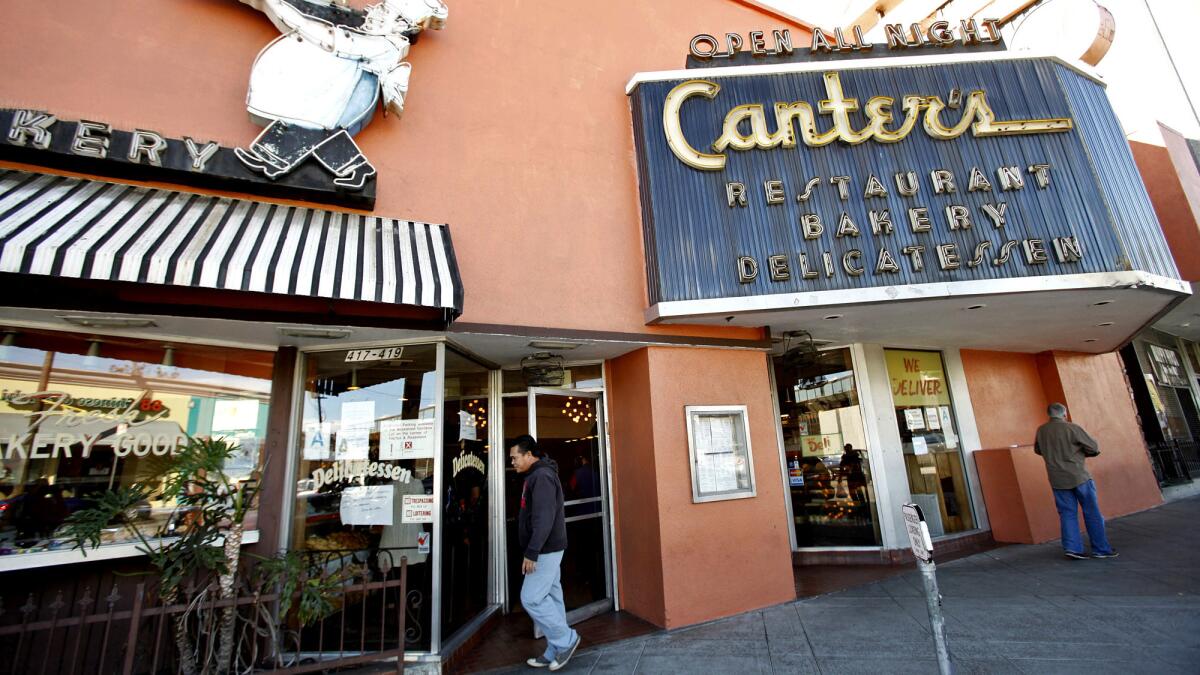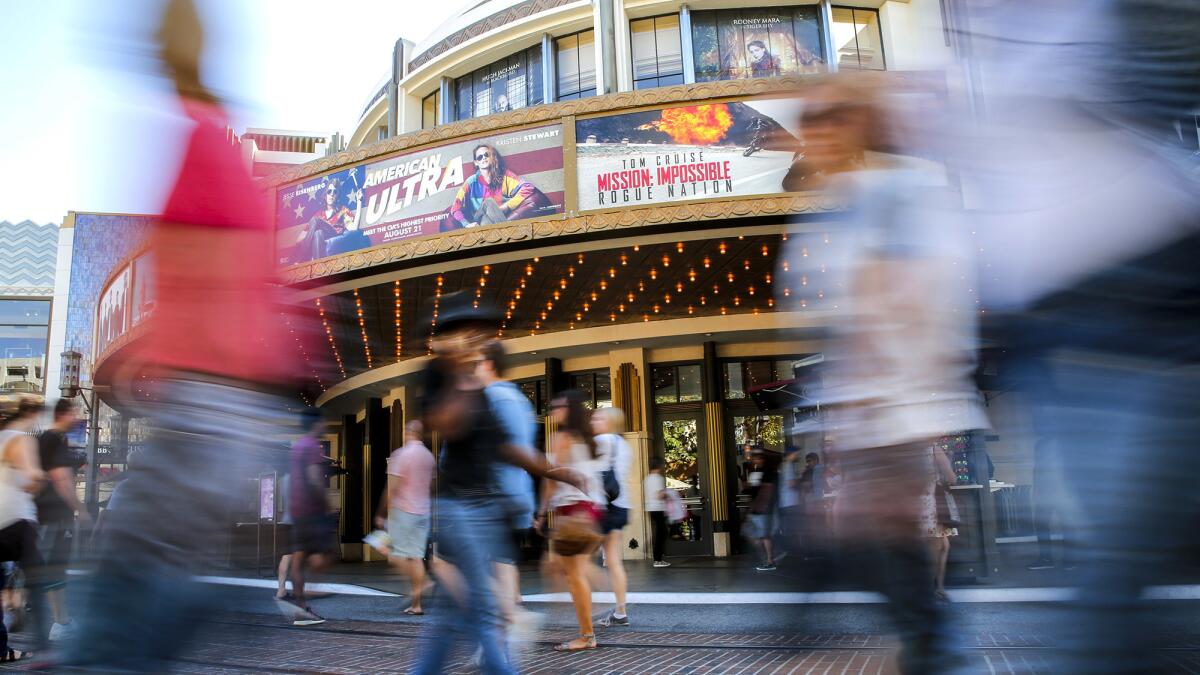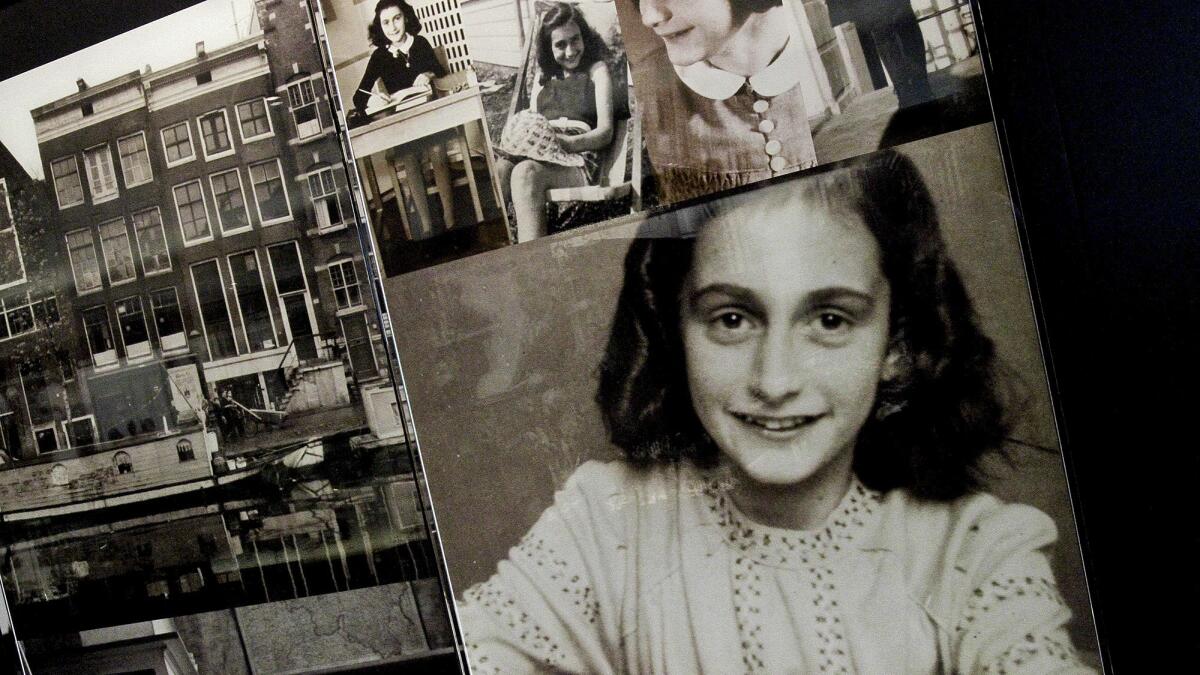Neighborhood Spotlight: Fairfax is bumper-to-bumper with L.A. culture

Canter’s, on Fairfax Avenue.
- Share via
The story of the Fairfax District begins at the turn of the 20th century with a dramatic, life-changing moment for one young dairy farmer.
A.F. Gilmore, who moved to Los Angeles from Illinois in 1870, was sinking a well to water the herd of cows he grazed near the present corner of Wilshire Boulevard and Fairfax Avenue when his drill struck oil — an exciting development for the humans involved, less so for the thirsty nonplussed cows.
Gilmore had stumbled upon the fabulously productive Salt Lake Oil Field, a massive reservoir of 50 million barrels of crude oil that lay under the parched 256-acre pasture he had purchased a few years before with a $500 loan.
The find made Gilmore wealthy, while the property he owned put him at the center of the expansion of the L.A. city limits in the 1920s and 1930s. The combination gave the flamboyant oilman tremendous influence on the development of the land north of the new Miracle Mile shopping district.
He began to subdivide the unproductive portions of his oil field to build neighborhoods of tidy little homes complete with driveways for residents to park their cars, an important selling point in an area of the city with no streetcar service.
Right from the beginning, these new developments became home to a thriving Jewish community, either because the restrictive housing covenants that drove housing discrimination in many parts of the city weren’t in place, or because they weren’t enforced.
As L.A.’s Jewish community began relocating out of Boyle Heights in the 1930s, Fairfax Avenue became a bustling shopping and dining thoroughfare for local and immigrant Jews. In 1941, even Boyle Heights-based Canter’s Deli bowed to the realities of this westward shift by opening a Fairfax branch.
Besides enjoying access to fantastic deli food in “Kosher Canyon,” residents also thronged to Gilmore’s Island, a massive shopping and entertainment complex at 3rd and Fairfax that featured a racetrack, a stadium where the Hollywood Stars played baseball and a drive-in theater. The land on which this wonderland stood now hosts the Grove, CBS Television City and the long running Farmers Market — the last of the Gilmore attractions, but another example of how one man’s lucky break shaped one of our great neighborhoods.
Neighborhood highlights

The scene outside the Pacific Theatres.
Shop (and star-watch) till you drop: Touristy, crowded and hugely influential, the Grove is a great place to shop and to gawk at TV stars doing the same thing you are: wondering why those trolley rides are so popular.
Something for everyone: Fairfax is a place where you can get a bowl of matzo ball soup, hit up a dive bar for some live music and cap off the evening with coffee and rugelach.
An unmistakable sense of place: One of L.A.’s most distinctive neighborhoods, Fairfax is home to the city’s only silent-movie theater and the Los Angeles Museum of the Holocaust in Pan Pacific Park.
Neighborhood challenges
Bumper to bumper: Fairfax may have been built with the car in mind, but not at the scale of the traffic volume that crushes through the intersection of 3rd and Fairfax every day. Throw in holiday traffic from the Grove, and it’s probably better to walk.
Expert insight

An image of Anne Frank.
Merrie Kung, a real estate agent at Keller Williams, is representing a home for sale in the Fairfax neighborhood. She said one distinctive feature of the area is the large number of “McMansions” that have been erected in recent years, drawing ire from longtime residents.
“You either get a fixer-type property for a million and a half to just under two, or you get one of these new constructions,” she said. “There’s not a whole lot of properties in the middle ground.”
For those that like existing properties, Fairfax offers “an array of architecture that is beautifully preserved,” she said.
“There’s a lot of beautiful, historic, old Spanish buildings in income properties, condos, single-family homes,” she said.
Market snapshot
In the 90036 ZIP Code, based on nine sales, the median price for single-family homes in August was $1.576 million, according to CoreLogic. That was a 5.4% increase in price year over year.
Report card
Within the boundaries of Fairfax is Melrose Avenue Elementary, which scored 883 out of 1,000 in the 2013 Academic Performance Index. Fairfax Senior High had a score of 761, and Whitman Continuation scored 623.
Nearby public schools include Hubert Howe Bancroft Middle, which scored 764. Hancock Park Elementary scored 919, and Laurel Elementary had a score of 755.
Sign up for Essential California
The most important California stories and recommendations in your inbox every morning.
You may occasionally receive promotional content from the Los Angeles Times.



